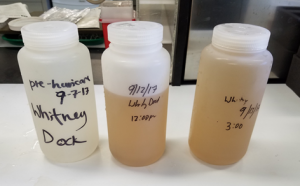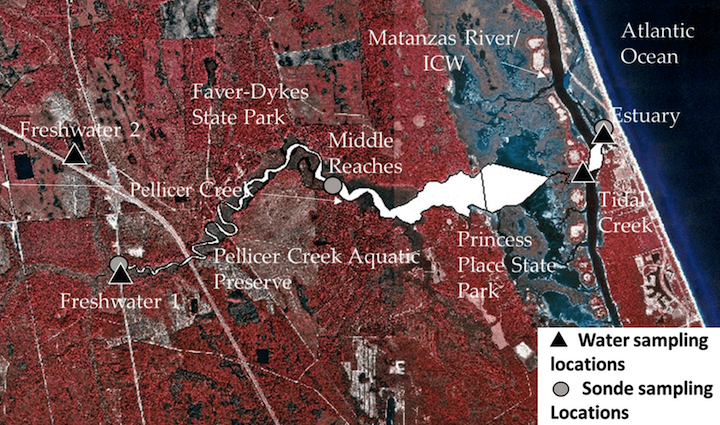A hurricane is a devastating natural disaster. Loss of life and destruction of property are two things most people think of in the aftermath of a hurricane. New UF/IFAS-led research focuses on how hurricanes impact some inland waters.
“A misconception is that hurricanes pick up salty ocean water and it rains down on land, but that’s not true,” explained Tracey Schafer, a doctoral candidate in the Soil and Water Sciences Department who graduates in August 2020. “Hurricanes do transfer ocean water inland along the coast due to strong winds and storm surge. We wanted to study the impact of that saltwater intrusion.”

Study
Schafer and her colleagues had the perfect opportunity during Hurricane Irma in September 2017. The storm hit the Florida Keys as a Category 4 storm and moved up the state into Georgia. The team conducted the study along Pellicer Creek, a major tributary of the Matanzas River near St. Augustine. Their monitoring locations spanned the aquatic continuum between a fresh blackwater river and an estuary.
“We wanted to see how hurricanes – these large-scale disturbances – disrupt normal conditions in such a way that they cause short-term changes in the ecosystem,” Schafer said.

Monitoring devices were placed at three locations (see image above) three days before Hurricane Irma’s impact on the area. Those captured data in 15-minute intervals, recording Chlorophyll-a, turbidity, salinity, dissolved oxygen, and fluorescent dissolved organic matter. Additionally, they collected data from water samples for another three months. That occurred every two to three days initially post-storm and then weekly for the remainder of the study. Those water samples were collected at four places across the study site.

Findings
“This study showed that the estuary and downstream sites took much longer to return to pre-storm conditions than the upstream freshwater sites,” Schafer said. “This helps us understand how future hurricane disturbance, which experts predict will become more common, will influence different areas along a river-estuary gradient. This knowledge could help with water quality management decisions in the future.”
The Journal of Marine Science and Engineering recently published the study’s findings. Her collaborators were Nicholas Ward at the University of Washington, and Paul Julian, Ramesh Reddy, and Todd Osborne at the University of Florida.
You can read the full article, “Impacts of Hurricane Disturbance on Water Quality across the Aquatic Continuum of a Blackwater River to Estuary Complex,” here: https://www.mdpi.com/2077-1312/8/6/412/htm
 0
0
